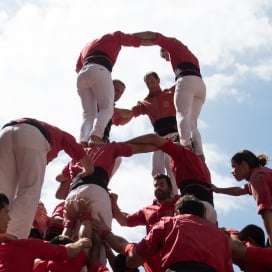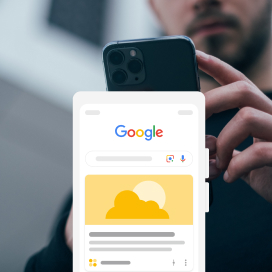Written by Aurora Maciá
Índice
- One thing is what the search engines say…
- …and another thing is what they do…
- And what do SEOs think?
- What do we think?
- If Google can distinguish natural links, won’t it be able to distinguish genuine social relationships?
- So, do social networks influence natural positioning?
- Hypothesis 1: “Social media has no impact on positioning”.
- Hypothesis 2: “Social media does not yet impact rankings but will in the future”.
The Amo Social Media, a free virtual congress on social media marketing and communication, took place on the 20th. Fernando Maciá was one of the speakers and he delved into the relationship between social networks and SEO. Fernando poses the following question: can social networks help SEO?
One thing is what the search engines say…
To answer this question, Fernando quotes statements from people like Matt Cutts or John Mueller on behalf of the search engines.
In 2010, Matt Cutts confirmed that they used the information they could track on Facebook and Twitter just like any other site, trying to understand reputation and using those signals in real time searches. However, he remembered the need to be able to track the information for use.
In 2012, it revealed that links were still critical, although in ten years social signals could be more important.
In 2014, he again insists that Google treats social media content like any other Web content, as it does not pay to develop specific engineering to crawl social media sites differently. Thus, he cannot understand identity or social relationships well. However, Matt Cutts recognized the potential of social media as a tool for sharing content, generating quality visits and spreading brand awareness.
On the other hand, John Mueller stated in 2015 that social signals do not directly affect rankings and that links on social networks in theory are nofollow, so they do not bring popularity, but they bring context to users and generate more content with your brand image or products. However, they could show certain results from Twitter or Google+ users that were related to the brand.
…and another thing is what they do…
Since 2005, the major search engines have been registering different types of patents, such as how to see which author is behind certain content and how to access all the content created by him/her. One of the main reasons why Google had to develop a social network such as Google+ consisted of users having to say who they were on other social networks and what websites they contributed to, allowing their profile or authorship to be identified and consolidating in a single digital identity the activity of that account on all social networks.
And what do SEOs think?
Fernando Maciá mentions an article by Danny Sullivan in which the expert tried to answer questions such as what signals Google and Bing actually analyze, how much weight is given to them and whether they affect positioning or just the way results are presented.
He goes on to cite a 2015 MOZ survey in which 150 SEO experts felt that social signals did influence ranking, although not too much. Google does not count how many times a post has been shared to account for it in the algorithm across the board, however, social signals, such as when a piece of content goes viral, do tend to correlate with good rankings.
What do we think?
In December 2015, different Spanish experts gave their point of view in a debate organized by Sistrix. The main conclusions were as follows:
- Social networks are a “lever” for the dissemination of content that will provide us with brand searches.
- A portion of social media mentions can be converted into genuine popularity
- Social content can be influenced by co-citation and co-occurrence
- There is no direct cause-effect, but there is a correlation.
Therefore, in general it seems that Google does not consider social media as a relevance factor because it is more difficult to crawl and because of the possibility that it could affect the quality of its results.
In the same way that there are tools such as Moz Analytics, OpenLinkProfiler: link disinfection, CognitiveSEO, etc. that indicate how many links are unnatural or suspicious of those pointing to certain websites, there are tools such as Majestic, Twitter Influence, Cognitive SEO: social graph, TwitterAudit, etc. that indicate the subject matter authority of a profile or its reputation and influence in a social network. Thus, it is strange that Google has not developed something similar for crawling social networks.
Correlation is not causation. A distinction must be made between direct and indirect effects. We should reflect on what might be plausible methods of influence today that have to do with the way we use social networks.
Improved positioning by influencing personalized results
Fernando gives the example of a landing page that the user accesses in the first place from a Facebook post but that later that user searches, through a keyword, in Google. The landing page has not been positioned better than before, but the CTR, the possibility of obtaining a click, has increased. If this user does the same thing (search for that website in Google) several times, this preference will be recorded. In this way, that particular subject would see that result increasingly better positioned. If this were to happen in the same way for a larger number of users, it would end up affecting the page ranking considerably.
Improved positioning by association KW > Brand
The process in this case is the same, except for the fact that when the user searches for the website in Google, he does so by adding the brand name to the keyword. If you do the same thing a certain number of times, Google will eventually notice a certain correlation between that keyword and the brand to which that keyword is associated. In this way, if a user were to search for that keyword, even if they did not mention the brand, Google would give priority to branded results.
The user in this case, after landing on the landing page, is so delighted that he shares his experience on his social profiles and follows the company on social networks. The next time you search for a keyword, Google may notice that there are certain social results that are relevant to that user. This would eventually associate the keyword with the domain of the result and make the results personalized. As a result, the domains would end up ranking better.
Hypothesis 1: “Social media has no impact on positioning”.
If we choose to believe in this hypothesis, we can at least use social networks to study the customer and understand their motivations or concerns. Everything that is generated in social networks helps us to know how to attract customers and how to generate content that helps them to document or justify their purchase decision. On the other hand, the best popularity today uses social networks as leverage. Through content marketing strategies we can get more visits for the pages that are more difficult to position. The important thing is to generate content that people can viralize, either through remarking, motion graphics, gamification, etc.
Hypothesis 2: “Social media does not yet impact rankings but will in the future”.
If we believe in this other statement, we should start working now. If we believe Matt Cutts’ premonition that in 10 years social signals will be much more relevant, we should start developing some strategies:
- Generate social profiles that acquire seniority and thematic authority.
- Promote communities interested in our product
- Identify potential influencers and opinion leaders relevant to our brand.
- Listening to our communities
- Share content that search engines will be able to index
- Facilitate and encourage the sharing and viralization of content.
- Generate content that people like to share on social networks, as search engines may also like it.
- Analyze the correlation between the content that generates engagement in our community and the content that is well positioned to continue generating that content.
Fernando ends by stating that social networks may not have a direct cause-effect, but they can always be used as a lever to viralize our content and achieve a better positioning.
The presentation was followed by a round of questions.



